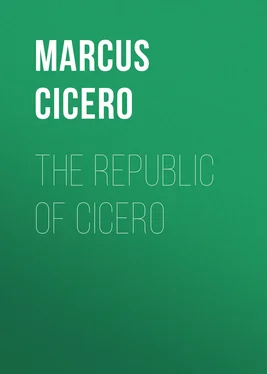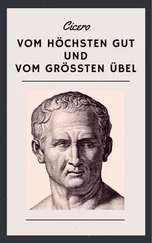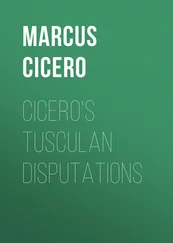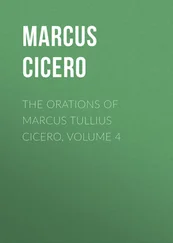Marcus Cicero - The republic of Cicero
Здесь есть возможность читать онлайн «Marcus Cicero - The republic of Cicero» — ознакомительный отрывок электронной книги совершенно бесплатно, а после прочтения отрывка купить полную версию. В некоторых случаях можно слушать аудио, скачать через торрент в формате fb2 и присутствует краткое содержание. Жанр: foreign_antique, Философия, foreign_edu, на английском языке. Описание произведения, (предисловие) а так же отзывы посетителей доступны на портале библиотеки ЛибКат.
- Название:The republic of Cicero
- Автор:
- Жанр:
- Год:неизвестен
- ISBN:нет данных
- Рейтинг книги:5 / 5. Голосов: 1
-
Избранное:Добавить в избранное
- Отзывы:
-
Ваша оценка:
- 100
- 1
- 2
- 3
- 4
- 5
The republic of Cicero: краткое содержание, описание и аннотация
Предлагаем к чтению аннотацию, описание, краткое содержание или предисловие (зависит от того, что написал сам автор книги «The republic of Cicero»). Если вы не нашли необходимую информацию о книге — напишите в комментариях, мы постараемся отыскать её.
The republic of Cicero — читать онлайн ознакомительный отрывок
Ниже представлен текст книги, разбитый по страницам. Система сохранения места последней прочитанной страницы, позволяет с удобством читать онлайн бесплатно книгу «The republic of Cicero», без необходимости каждый раз заново искать на чём Вы остановились. Поставьте закладку, и сможете в любой момент перейти на страницу, на которой закончили чтение.
Интервал:
Закладка:
In this most glorious year of his life, and at the very time when he was occupied in saving his country, Octavius Cæsar was born; by whose arts and influence Cicero, as well as the republic, were not more than twenty years after destroyed. And although he had acted so noble a part toward his country, which under his government had been saved from the most profligate attempt that had yet been made upon its liberties; and enjoyed the highest rank in the senate, and the first consideration from all good men; corruption had now reached such a height, that pre-eminence in virtue, shining forth in so active a citizen as Cicero, who was constantly thwarting the designs of bad men, served but to unite their efforts against him. He became henceforward the object of their hatred and vengeance. Cæsar, who did not believe in a future state, and who consequently had no principle to restrain him, was constantly plotting means to usurp the government. Pompey, in whose interest Cicero had always been, and who at the close of the Mithridatic war had become the most powerful man in the Republic, was afraid to disoblige the numerous enemies of Cicero, and declined even to strengthen him by a public approbation of the measures he had taken to suppress the conspiracy of Catiline. The luxurious and the corrupt, who far outnumbered the rest, were willing to sell the republic and themselves to the highest bidders. The people were as usual the tools of demagogues. Every thing conspired to accelerate the downfall of the republic. In the face of these fearful odds stood Cicero, a large majority of the senate, and of the equestrian order, which comprehended the independent landholders and gentry of the Roman nation: and with but little other support than the satisfaction of being engaged in the noblest of causes, the maintenance of regular government. It is most painful to look back upon the history of the degradation of such a people; corrupted and ruined by their blind admiration of that falsest of all idols, military glory.
An event occurred the year after his consulate, which brought him into a new conflict with some of the worst of these men. P. Clodius, at this time a quæstor, a vicious and debauched young man of family, and who possessed many personal advantages, had an intrigue with Cæsar’s wife Pompeia. Satiated with ordinary voluptuousness, he disguised himself as a woman, and entered the house of Pompeia in the night time, when she with other distinguished Roman matrons, was celebrating the mysteries of the Bona Dea, or Patroness of Chastity. He was discovered and fled. Such was the respect in which these mysteries, at which women alone officiated, were held, that the profanation excited the utmost indignation throughout the city. Even Cæsar found it necessary to put away his wife. The senate directed the consuls to prepare a law for the trial of Clodius before the people, which was resisted by one of the tribunes friendly to Clodius. At length it was agreed that a law should be passed to try him before the prætor and a select number of judges. Clodius rested his defence upon an alibi, which he endeavoured to sustain by witnesses. When Cicero was called to give his deposition, he was insulted by the mob which adhered to Clodius; but such was the veneration in which he was held, that the judges stood up, and received him with great honour. He testified that Clodius had been with him in his house in Rome on the very day of the pollution. Cæsar who was also called, said that he was ignorant of the whole affair; although it occurred in his own house, and in the presence of his mother and sister, who had deposed to the truth of the accusation. Being asked, why then he had put away his wife? he answered, “Because those who are connected with me, must be as free from suspicion as from crime.” 6 6 Quoniam, inquit, meos tam suspicione quam crimine judico carere oportere. Suet. J. Cæs. 74.
That the wife of Cæsar must be free even from suspicion, is a saying that has passed down to our days: yet too many who have heard it are ignorant of the circumstances attending its origin. We read the commentaries of Cæsar at school, and are fired with admiration at his talents and successes. We are thus prepared to pity his death and the manner of it. But the military and political glories of Cæsar, can never furnish an apology for a profligate private life; and a memorable saying is stripped of every attraction, when we know that it was uttered by the lips of a perjured atheist.
In a letter to Atticus, Cicero draws a curious picture of the judges selected to try this famous cause; a majority of whom appears to have been packed from the outcasts of all the orders, and to have been paid for the occasion. Clodius was acquitted by a majority of thirty-one voices over twenty-five. Upon their appointment some of them had requested a guard from the senate to protect them from the mob. Upon which occasion, Catulus a distinguished member of the senate, very facetiously asked one of the judges, “why they wanted a guard, and whether it was to protect the money which Clodius had bribed them with?”
After his acquittal, Clodius was wont to attempt to throw ridicule upon Cicero in the senate, finding it vain to encounter him in argument, and hoping to divert in some degree the force of his attacks. “So the judges” said Clodius, “would give no credit to your oath.” “Twenty-five of them did,” replied Cicero: “the rest would give you none it seems, but made you pay beforehand.”
After the return of Pompey to Rome, as well as of Cæsar from Spain, a triumvirate of interests was formed between these two and Crassus: each having his own ascendancy in view. Cæsar, to make the interest it was thus intended to direct against the independence of the republic, still stronger, made overtures to Cicero, who declined connecting himself with them. At length Cæsar openly declared against him, and favoured the election of Clodius to the tribunate, in the which he succeeded. Being now in authority, he brought forward the law, that whoever had taken away the life of a Roman citizen, uncondemned, should be interdicted bread and water. This was directed against Cicero, in relation to his consular acts respecting the conspirators; and affected him so much, that although the law was in general terms, and his name was not mentioned in it, he changed his garments, and appeared abroad sordidly dressed to attract the compassion of the people. The young Romans of liberal character, to the number of twenty thousand also changed their dress, and accompanied him; soliciting the favour of all in authority, and of the people, against the passage of this law. But the combination of bad men proved too strong against him, and Pompey having refused his protection, Cicero was induced by the advice of his friends, to withdraw himself into a temporary exile from Rome. This humiliating event took place in his forty-ninth year. During his absence his residences both in town and country, which were upon a scale commensurate with his dignity, were despoiled; and together with the furniture appropriated by the consuls and by Clodius. At length the daring insolence of that tribune, and the perpetual broils he occasioned, began to indispose all men against him, except his immediate profligate retainers. Advantage was taken of this to propose in the senate the recall of Cicero; which finally prevailed at a very numerous convocation of the senators and magistrates; Clodius alone giving a dissenting voice. At its final passage into a law by the Roman people, the field of Mars was crowded with their assembled centuries. Such was the public veneration for him, that voters from every town in Italy were present to insure the passage of a law which restored so great a benefactor to his country. All the centuries concurred in an act thus most solemnly passed by the whole Roman people. In anticipation of the event, he left Dyrrhachium in Macedonia, and soon after his arrival at Brundisium, where his daughter Tullia had come to meet him, he received the welcome news from Rome. His journey was a continued triumph, and he was received on his arrival at the city in the most enthusiastic manner. An insufficient sum of money was voted to him to rebuild his mansions. When he had almost finished his palatine house, it was attacked by one of Clodius’ mobs, and destroyed. Broils and slaughters were now so common in the streets of Rome, that gladiators were retained to assist in these feuds; in which the consuls of the same year were sometimes opposed to each other. Cicero who had now reached his fifty-first year, was again made to feel how unremitting is the hatred of enemies, and uncertain the support of friends. Public virtue appeared to him to have no longer any value in the eyes of the Romans. He saw that every man attended more to his private safety and advancement, than to the public peace and dignity of the city; and perceiving the necessity of a powerful protector for himself and family in his old age, he appears from one of his letters to have determined to conform himself in every thing to the pleasure of Pompey. We also see him from time to time engaged in agreeable services to Cæsar, with whom Pompey was yet connected. Experience and persecution appear to have induced him to adopt a course foreign to the character of the perfect citizen he has pourtrayed in his republic. In his fourth epistle to Atticus, he says 7 7 Sed quoniam qui nihil possunt, &c.
“If they will not be friendly to me who possess no power, I must endeavour to make those like me who have the power of being useful. ‘I told you so long ago,’ you will say; I know that you did, and I was an ass for not taking your advice.” The opinion too of his friend Cælius, would have great weight with most men, in such disturbed times. “It cannot have escaped you, that the duty of men amidst domestic dissensions, is to espouse the honestest side, as long as the contention is of a civil nature, and force is not used. But when it comes to wars and camps, they should take the strongest side, and consider that the best which is the most safe.” 8 8 Ep. fam. 8. 14.
Интервал:
Закладка:
Похожие книги на «The republic of Cicero»
Представляем Вашему вниманию похожие книги на «The republic of Cicero» списком для выбора. Мы отобрали схожую по названию и смыслу литературу в надежде предоставить читателям больше вариантов отыскать новые, интересные, ещё непрочитанные произведения.
Обсуждение, отзывы о книге «The republic of Cicero» и просто собственные мнения читателей. Оставьте ваши комментарии, напишите, что Вы думаете о произведении, его смысле или главных героях. Укажите что конкретно понравилось, а что нет, и почему Вы так считаете.












